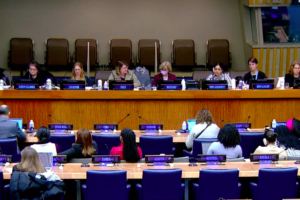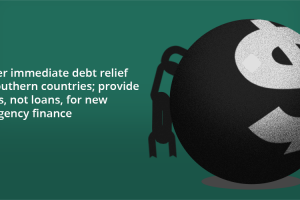Photos: Carlo Manalansan & Wikimedia Commons
If the Bank’s recent meeting and related public reports are an indication of the Bank’s direction, peoples and their organisations could expect more of the fundamentally same policy trajectory that creates debt even in a time of crisis, neglects structural issues, and prioritises profit interests of big private sector with its socially and environmentally unsustainable projects.
The Asian Development Bank (ADB), one of the world’s regional multilateral development banks (MDB), meets representatives from its 68 member countries annually to discuss the status and trajectory of the Bank. Due to the outbreak, the ADB’s Annual Governors’ Meeting was postponed until September, still within the theme of “Integration, Inclusivity, and Innovation,” and only held its “Business session” virtually on 22 May 2020.
Long criticised by people’s organisations and civil society organisations (CSOs) for being a stalwart of big business-oriented policy in the Asia-Pacific, having pushed neoliberal privatisation of social services and deregulation of economic sectors, the ADB is led by Japan and the United States (US) which comprise the largest parts of the Bank’s capital shares (15.6% each) and voting powers (12.7% each).
The 20-minute virtual “Business session” described the Bank’s allocation commitments for Asia-Pacific countries amid the global recession and COVID-19 outbreak. These foreshadow the direction of the September meetings. If the Bank’s recent meeting and related public reports are an indication of the Bank’s direction, peoples and their organisations could expect more of the fundamentally same policy trajectory that creates debt even in a time of crisis, neglects structural issues, and prioritises profit interests of big private sector with its socially and environmentally unsustainable projects.
A future of more debt?
The ADB continues to heavily rely on loans, which are not the best instrument in a time when many countries in the global South have debt troubles, partly if not largely from the exposure to volatile capital, in turn due to the neoliberal policy fixation with “financial and economic integration”. For civil society organisations, the looming debt crisis requires ambitious, immediate and across-the-board debt relief, including permanent cancellations. The situation demands grants, not new debt-creating finance (which will likely result to future borrowing, and to be shouldered by citizens).
The ADB continues to heavily rely on loans, which are not the best instrument in a time when many countries in the global South have debt troubles, partly if not largely from the exposure to volatile capital, in turn due to the neoliberal policy fixation with “financial and economic integration”.
The ADB President boasted USD 20 billion worth of available resources for quick financing amid the COVID-19 outbreak.[i] Looking at it more closely shows that it is largely made up of a USD 17.5 billion budget for loans (USD 15.7 billion at near-market terms, and USD 1.8 billion of lower interest loans but still debt).[ii] Seven countries have received USD 5 billion from this program; grants and technical assistance at a relatively smaller total of USD 79 million for 40 countries.The Bank’s 2019 Annual Report shows the same, as USD 15.6 billion of its 2019 disbursements were loans(83% at near-market terms).
CSOs have been clamouring for debt relief from all actors, including multilateral banks such as the ADB. The Bank President’s statement about “striking a balance” between ADB’s “financial sustainability” and developing country needs could be read in the light of its reliance on debt-creating instruments. It is a more diplomatic phrasing, perhaps, of a recent World Bank statement that calling for debt relief from the WB and other MDBs is “harmful”[iii] for it would “disrupt” assistance to countries.
The ADB has worked with the International Monetary Fund and other MDBs in co-financed loans for supposed COVID-19 response. For example,the Philippines, the host country of the ADB Secretariat, hasracked up new loans: a USD 750 million loan co-financed by the ADB and the China-led Asian Infrastructure Investment Bank (AIIB) last late April,[iv] another late April USD 1.5-billion ADB loan,[v] and a USD 500 million World Bank loan.[vi]However, the Philippine government has so far implemented a militarised lockdown longer than China’s, with sorely deficient health and social measures, and with no significant testing and contact-tracing.
Exclusionary, false “sustainability”
The Philippines’ ADB-supported New Clark City project was recently lauded by the Bank as “a technologically smart, environmentally sustainable metropolis.” The opposite is actually true, based from reports of CSOs and even progressive academics.
CSO reports confirm that the ADB is a major financier of infrastructure projects in the Asia-Pacific, and that it relies on debt-financing for projects.[vii] In its Annual Report, the ADB also claims to have allocated USD 6.5 billion in climate-related financing in 2019. These must also be scrutinised into how much are loans compared to grants, as the former comprise most of the world’s financing for climate measures.
A related issue is how recent ADB reports misleadingly attribute sustainability to certain projects, despite harsh impacts to communities. As just one example, the Philippines’ ADB-supported New Clark City project was recently lauded by the Bank as “a technologically smart, environmentally sustainable metropolis.” The opposite is actually true, based from reports of CSOs and even progressive academics: while it benefitted its investors and contractors, the project displaced farmers’ and Indigenous Peoples’ communities, trampled on their farmlands which are their sources of livelihoods, and destroyed mountain ranges and the ecosystems therein.[viii] Many community members also attest that they were not informed nor consented to the project.
These in fact, challenge the Bank’s claim to “inclusivity” in the 2020 Annual Meeting theme. People’s organisations can expect more of the same to come. Its 2020 Business Session promised the same as expansion in financing the private sector, into “new sectors and frontier markets,”[ix] remains central in the ADB’s plans. It remains committed to its trajectory as seen in the Strategy 2030, the Bank’s operational plan today, made in tune with other international finance institutions’ drive to encourage all things “private sector” (de facto dominated by big private sector) in development—through financing and co-financing projects, public-private partnerships, as contractors, among others.
“Innovation” for whom? A peek into the ADB’s future
For the current Chair of the Meetings, South Korea, as represented by its minister of economy and finance, the world must “turn the crisis to an opportunity for innovation.” A crucial aspect of the theme of the Annual Meetings, “innovation” is used in the ADB’s rhetoric to refer to digitalisation of economies, big corporations’ steps to adapt their production chains, and has become a buzzword for technological “solutions”.
The impacts of such solutions however remain constrained by various facts: the prevailing digital divide; how the ownership of technologies are dominated by corporate giants in the industry who are ever searching for new markets and profit opportunities; and how the use of technology in “improving” value chains more often relate to their use in worsening inequalities and exploiting cheap wages and labour.
As it currently insists on prioritising the private sector, the ADB seems to be inattentive to growing concerns and critiques raised against the dominant economic policy trajectory of neoliberalism, which heavily weakened countries’ health systems and other social services.
The ADB President claims they are studying how countries can “re-open their economies and rebuild smartly” in a post-outbreak situation. Crucially, as it currently insists on prioritising the private sector, the ADB seems to be inattentive to growing concerns and critiques raised against the dominant economic policy trajectory of neoliberalism, which heavily weakened countries’ health systems and other social services, and against the broader system of monopoly capitalist accumulation that has been crucial in impoverishing workers and other working peoples in the global South.
The future must belong to people’s development
If there must be talk about forging something new for long-term people’s development, it must be for radical shifts in international economic and finance policy. The international economic policy and governance regime of the future, in the coming months and in the long-term, must learn from the lessons of the outbreak.
The world would not reach any destination of sustainable development for the people if the economy runs on the same engine. Claims to “sustainable recovery” would be a smokescreen for fundamentally business-as-usual if a necessary, ambitious overhaul would not take place. Such an overhaul would include casting off the neoliberal dogma, and at the very least, a re-evaluation of the functions and the justificationsfor the existence of the world’s multilateral development banks.
A true “inclusivity” must mean that people and their organisations would be the primary actors in development. They must substantively shape, even lead, development, financial and broader economic policy that affect them—from health responses to the outbreak to the choice of infrastructure projects, the decisions of entering any loan or grant agreement, and even development planning processes.
A true “inclusivity” must mean that people and their organisations would be the primary actors in development. They must substantively shape, even lead, development, financial and broader economic policy that affect them—from health responses to the outbreak to the choice of infrastructure projects, the decisions of entering any loan or grant agreement, and even development planning processes. This is to ensure that crucial resources are used for working peoples’ needs and development during and after the outbreak. ###
[i] Asian Development Bank. 2020. “ADB Governors approve corporate financial matters in first virtual annual meeting.” https://www.adb.org/news/adb-governors-approve-corporate-financial-matters-first-virtual-annual-meeting
[ii] Asian Development Bank. 2020. “ADB’s Comprehensive Response to the COVID-19 Pandemic.” Policy Paper, April. https://www.adb.org/sites/default/files/institutional-document/579616/adbs-comprehensive-response-covid-19-pandemic-redacted-version.pdf
[iii] David Malpass, World Bank Group. 2020. Speech at the virtual UN High-level Meeting on Financing for Development in the Era of COVID-19 and Beyond.
[iv] De Vera, Ben. 2020. “AIIB to cofinance COVID-19 response plan with $750-M loan.” Inquirer.net, 29 April. https://business.inquirer.net/295980/aiib-to-cofinance-covid-19-response-plan-with-750-m-loan
[v] De Vera, Ben. 2020. “ADB lends $1.5B for PH fight vs COVID-19.” Inquirer.net, 25 April. https://business.inquirer.net/295691/adb-lends-1-5b-for-ph-fight-vs-covid-19
[vi] Rivas, Ralf. 2020. “World Bank loans $500 million to PH for coronavirus response.” Rappler, 10 April. https://www.rappler.com/business/257613-world-bank-approves-loan-coronavirus-philippines-april-2020
[vii] Reality of Aid-Asia Pacific. 2020. Aid Observatorio Synthesis Report 2020. https://realityofaid.org/aid-observatorio-synthesis-report-april-2020/
[viii] Subingsubing, Krixia, and Mariejo Ramos. 2020. “P607-B Clark ‘green city’ to displace Aeta communities.” Inquirer.net, 8 July. https://newsinfo.inquirer.net/1138945/p607-b-clark-green-city-to-displace-aeta-communities
[ix] Asian Development Bank. 2020. “Leading the Response and Recovery of Asia and the Pacific through Decisive Action, Country Presence, and Financial Strength – Masatsugu Asakawa.” https://www.adb.org/news/speeches/leading-response-recovery-asia-pacific-decisive-action-presence-financial-strength-masa



